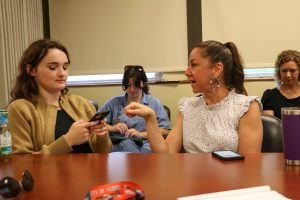In the spring, faculty from across UF/IFAS CALS gather for the CALS Mentor Academy after being nominated and selected. Through this program, faculty from CALS focus on their ability to improve their graduate student mentoring skills. This past spring, AEC faculty member, Dr. Tre Easterly participated in the third CALS Mentor Academy. Through eight weekly meetings, Dr. Easterly learned from facilitators Samira Daroub and Christine Miller, how effective communication, aligning expectations, promotion of professional development, understanding, fostering independence, and more impacted the mentor-to-mentee experience.
With the fall 2022 semester off to a quick start, AEC has begun its AEC Gathering series. AEC Gatherings are a weekly opportunity for AEC faculty, staff, and graduate students to come together to learn, reflect, and enjoy each other’s company. Each week AEC faculty, staff, visitors from IFAS, or external stakeholders present on their recent work or key projects, shedding light on the work that’s happening around campus, the community, the state, and beyond. On September 1, for the second AEC Gathering of the semester, we heard from Dr. Tre Easterly about his experience in the CALS Mentor Academy.
Walking away from the experience, Dr. Easterly’s goal was to, “bring intentionality to mentorship in AEC.” During the Thursday gathering the department was walked through the basics of the program, then invited to consider two things:
-
What are the traits of an ideal mentor?
-
What are the traits of an ideal mentee?
Anonymously through the Teams Whiteboard feature, faculty and students were able to list traits that fell into either category. The most common answers being:

Ideal traits of a mentor:
- Transparent
- Relatable
- Empathetic
- A good listener
- Patient
- Good and open communicator
Ideal traits of a mentee:
- Communicative
- Responsible
- Intentional
- Open to learn
- Teachable
- Willing to go out of their comfort zone
One big takeaway from this exercise was another trait listed on the ideal traits of a mentee: “learns to become a good mentor through their experience as a mentee.” And Dr. Easterly made note that this is where intentionality can come in as a mentor to students. It’s also important to note that through these lists there was no discussion of “strong writing skills” or “ability to read 6 journal articles in a week.”
Wrapping up the conversation, Dr. Easterly commented, “the perfect mentor doesn’t exist.” He explained, “it is critical to have a comprehensive support team that lends advice on various aspects of your professional growth.” Having open and clear communication about expectations is crucial to cultivating a strong working relationship between mentors and mentees.
 1
1
